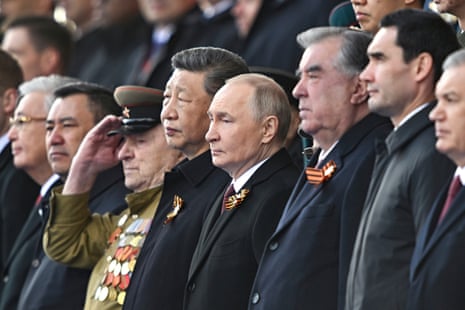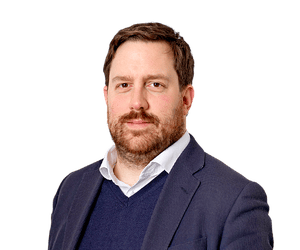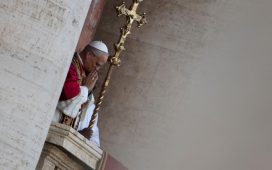Putin speaks at Moscow parade
Russian president Vladimir Putin has just delivered a fairly brief (for his standards) speech at the Victory Day parade in Moscow.

He spoke of “joy and sadness, of pride and gratitude … to the generation that crushed the nazism at the cost of millions of lives.”
He also talked that Russia will “never agree” to events of the second world war “being distorted,” as he vowed to defend the dignity of the Russian army and always stand to “nazism, to Russophobia, to antisemitism.”
(Remember, Putin justified the invasion of Ukraine as fight against “neo-nazism.”)
And, indeed, he claimed that “the whole” of country backed the ongoing invasion on Ukraine.
“We are proud of their bravery and determination, of the fortitude that has always brought us only victory,” he said.
In a nod to Xi Jinping in the stands, Putin also made a pointed reference to not only Russian military successes and the contribution of the allied forces, but also “the courageous people of China” specifically.
Key events
Russia’s Putin greets North Korean military personnel at Red Square parade
Back to Moscow, Russian president Vladimir Putin greeted North Korean military personnel on Red Square after a military parade marking the defeat of Nazi Germany, several weeks after Pyongyang’s troops helped Moscow oust Ukrainian forces from its Kursk region.
“All the best to you and all your troops,” state news agency TASS cited Putin as saying to several highly decorated officers from North Korea, which has emerged as one of Russia’s main allies during its Ukraine offensive, AFP reported.
Germany’s Merz says Russia could face new sanctions as he pledges support for Ukraine
Separately, new German chancellor Friedrich Merz is in Brussels today, his first trip to the EU’s capital since being appointed, where he faces a long day of meetings, starting with a chat with European Council president António Costa.
During a joint press conference, Merz paid tribute to one of the founding fathers of the European Union, Robert Schuman, for his foresight that “no one single country would be able to overcome the challenges alone that he saw 75 years ago and that we see again today.”
He stressed that he started his term in office by visiting Paris and Warsaw, but wants all European partners to “be able to trust Germany, and know they can rely on Germany.”
Merz declared Germany will continue to “firmly stand with Ukraine,” and “do everything we can do end this war as quickly as possible.”
He stressed that “Ukrainians need to be involved” in any discussions, and pledged that the EU would continue to “support Ukraine in being able to effectively defend itself.”
“We call upon Russia to now engage in a path towards a lasting peace, and if that does not happen, we will not hesitate to increase the pressure of sanctions with our European partner and the United States,” he said.
Outlining his priorities for EU policy, he said that member states should prioritise advancing the EU single market as a driver of the bloc’s competitiveness, and push for simplifying the rules.
The German chancellor also defended his government plans to tighten border checks, insisting that – despite reports in the German press – he had not declared a state of national emergency on migration, and all checks will comply with EU laws.
After his meeting with Costa, Merz will meet European Commission president Ursula von der Leyen.
British foreign minister to join 17 ministers on visit to Lviv to show support for Ukraine
Elsewhere, British foreign minister David Lammy will on Friday meet with his Ukrainian counterpart and 17 other foreign ministers in Lviv to discuss how to secure a just and lasting peace in Ukraine, Britain’s foreign office said in a statement reported by Reuters.
“We stand for a just and lasting peace, for a secure Europe, and for accountability and justice,” Lammy said.
In his briefing, which just concluded, Tusk also pointedly criticised Slovak prime minister Robert Fico – without mentioning him by name – for attending the Moscow parade.
He said:
“For me it is unthinkable that one can be from this part of the world and – during the … Russian aggression against Ukraine – be in Red Square and celebrate the Victory Day together with those who are murdering children, civilians and attacking other countries.”
Poland’s Tusk hails new ‘cooperation’ treaty with France, with mutual security guarantees
Meanwhile in Warsaw, Polish prime minister Donald Tusk is currently briefing the media before his trip to France to sign a new Polish-French “enhanced cooperation and friendship treaty.”
Tusk will meet French president Emmanuel Macron in Nancy, France in early afternoon, with the signing ceremony scheduled for 4pm, to be followed by a joint press conference.
France has similar treaties with Germany and the UK, but it is the first time it will sign such an agreement with a country it doesn’t share a border with, Tusk says.
He says that signing the deal on Europe Day, a day to mark the anniversary of creating the European Union, sends a clear political signal.
“It all forms a certain narrative, which could be even more important than provisions in various documents and treaties,” he says.
Listing the most important features of the treaty, he says it includes further mutual security and defence guarantees in case of an attack, and a provision “opening up” the path to closer cooperation on nuclear deterrence.
“Both countries will pledge to offer mutual help, including military help, and we know what military capabilities France has,” he says.
The 14-page deal also includes provisions on economic, energy, and cultural cooperation, Tusk says, adding it was a “turning moment” for Poland’s international relations.
The Polish prime minister adds that the Polish-French treaty will also feed into discussions on a new Polish-British treaty, which is being drafted.
Putin speaks at Moscow parade
Russian president Vladimir Putin has just delivered a fairly brief (for his standards) speech at the Victory Day parade in Moscow.
He spoke of “joy and sadness, of pride and gratitude … to the generation that crushed the nazism at the cost of millions of lives.”
He also talked that Russia will “never agree” to events of the second world war “being distorted,” as he vowed to defend the dignity of the Russian army and always stand to “nazism, to Russophobia, to antisemitism.”
(Remember, Putin justified the invasion of Ukraine as fight against “neo-nazism.”)
And, indeed, he claimed that “the whole” of country backed the ongoing invasion on Ukraine.
“We are proud of their bravery and determination, of the fortitude that has always brought us only victory,” he said.
In a nod to Xi Jinping in the stands, Putin also made a pointed reference to not only Russian military successes and the contribution of the allied forces, but also “the courageous people of China” specifically.
Morning opening: Alternative futures of Europe

Jakub Krupa
A day after Victory in Europe Day celebrations in most of Europe, Russia stages a lavish – “biggest ever” – parade in Moscow to mark the 80th anniversary of the end of the second world war, and show off its military might amid its continuing invasion on Ukraine.
Russian president Vladimir Putin hosts a number of global leaders, including China’s Xi Jinping and Brazil’s Luiz Inácio Lula da Silva. Despite repeated criticism from Brussels, Slovak prime minister Robert Fico is also there, the only EU leader in attendance.
In stark contrast, the Moscow parade takes place on the same day as many European foreign ministers make a symbolic visit to Ukraine instead to announce another round of support for the country and the creation of a new International Tribunal for the Punishment of War Crimes and the Crime of Aggression against Ukraine.
Elsewhere, France’s Emmanuel Macron and Poland’s Donald Tusk are set to sign a new treaty on “enhanced cooperation and friendship” – expected to include security and defence elements – and German’s new chancellor Friedrich Merz visits Brussels for talks with the EU and Nato, after being in Paris and Warsaw earlier this week.
The two sets of events – engaging two different blocks of countries – offer very contrasting visions of potential future for Europe and come at the time of particularly tense moment in the Russian war of aggression on Ukraine, with more countries, particularly on the eastern flank of Nato, fearing similar attacks in the coming years.
We will bring you all the key updates throughout the day.
It’s Friday, 9 May 2025, it’s Jakub Krupa here, and this is Europe Live.
Good morning.









